#exvangelicals
Text

The kind of love I was taught about in the church was conditional.
You only got the best if you were the best.
You had to give 100% of your heart and hold nothing back.
When I thought I had, I was told it wasn't good enough... that I was either sinful anyway or that I was intentionally hiding something or I was unaware of some deep secret sin that I was harbouring in my deceitfully wicked heart.
No candy for me!
Do you know what I'm talking about?see less
#cartoonist#cartoonoftheday#deconstruction#deconstructing#exvangelical#exchristian#exvangelicals#exfundie#jesus#jesuschrist#christ#halloween#halloweencostume#christianhalloween
31 notes
·
View notes
Text
(LATimes) In ‘The Exvangelicals,’ Sarah McCammon tells the tale of losing her religion

Sarah McCammon.
(Kara Frame)
Book Review
The Exvangelicals: Loving, Living, and Leaving the White Evangelical Church
By Sarah McCammon
St. Martin’s Press: 310 pages, $30
The term “exvangelical,” a reference to disillusioned evangelicals after Donald Trump commandeered 81% of the white evangelical vote in 2016, has always struck me as contrived and a tad too cute. It’s a variation — a reversal, I suppose — of Ronald Reagan’s famous lament that he didn’t leave the Democratic Party; the Democratic Party left him.

Although the author, a national political correspondent for NPR, purports to be telling “the stories of millions of Americans,” this book is really autobiography with a few cameo roles. Nevertheless, McCammon’s history is captivating and well told: a childhood cosseted in the evangelical subculture, with schools and sermons trumpeting the Christian nationalism that’s fueling so many culture wars now.
In “The Exvangelicals,” McCammon’s evolution unfolds as a series of steps, chapter by chapter, on a descending staircase toward disillusionment.
She begins by questioning the conviction that only Christians (by which evangelicals mean evangelicals) go to heaven, then rejects creationism and embraces the veracity of science before moving on to such matters as female submission and sexual identities.
“Having a female body came with heavy responsibility and fear,” she writes, referring to admonitions at home and school to dress modestly lest she inflame unholy passions.
Perhaps not surprisingly, McCammon devotes a great deal of attention to her own sexual awakening, much of which occurred at the small evangelical college she attended (which, as it happens, is where I was an undergraduate a couple of decades earlier). The “purity culture” of evangelicalism demanded that women be demure, while young men were cast as warriors and defenders.
“On our wedding night, we didn’t know how to have sex,” one informant tells McCammon, who adds, “That experience is not unusual for young evangelicals who begin their honeymoons with little or no sexual experience, and, often, years of sexual shame.”
Many exvangelicals testify to enduring religious trauma, some of it caused by corporal punishment or perhaps fear of the Rapture, the belief popular among evangelicals that Jesus will return soon to collect the faithful and those “left behind” will face terrible judgment. One psychotherapist cataloged the symptoms of religious trauma as “anxiety and depression, chronic pain and intestinal symptoms, feelings of shame and a tendency toward social isolation.”
Religious trauma drives many evangelicals, including the author and one of her siblings, into therapy and out of evangelicalism, though not necessarily in that order.
McCammon is especially effective at juxtaposing the condemnations of Bill Clinton’s philandering with full-throated defenses of Donald Trump’s sexual predations — the condemnations and the defenses coming from the same evangelical sources with no apparent self-awareness and no hint of irony. Even more devastating is the author’s examination of her Christian school textbooks and recollections of classroom conversations in those schools regarding slavery. One textbook conjured the halcyon days on the plantation — “Southern weather was warm and the slaves stayed healthy” — and a student recalled his teacher’s remark that bondage “was a pretty good gig for them; they got free housing and all their meals were taken care of.”
If historical accuracy and context are missing from these textbooks, however, those qualities are also lacking in McCammon’s narrative, although her missteps are not nearly so egregious. She talks about evangelicalism reaching its peak of influence “beginning in the late 1980s,” ignoring the fact that evangelicals set the nation’s social and political agenda for much of the 19th century, especially in the years before the Civil War, albeit with very different sensibilities.
The author might have explored how white evangelicalism was different before its hard-right turn in defense of racial segregation in the late 1970s. Might an understanding of evangelicalism’s generally laudable social agenda in centuries past — abolition, prison reform, public education, even women’s suffrage were all evangelical concerns — have provided McCammon and her compatriots with a standard to which they could appeal in their quest to reform their churches?
As in many coming-of-age narratives, those who leave the safety of the subculture rarely have smooth landings. McCammon’s marriage to a classmate three months after their college graduation “felt awkward and surprisingly lonely,” she writes; it ended in divorce. The author tells of her parental-enforced estrangement from her grandfather because he was gay. The two mended their relationship and became close during the final years of his life, although McCammon’s overtures to him created a rift with her mother and father.
The author’s schoolmate, Jeff, came out as gay, thereby rupturing the relationship with his parents, who refused to acknowledge his husband at their son’s graduation from seminary. “I am not an evangelical in large part because there’s no room in most of American evangelicalism for queer people,” he told the author. “I’m angry about that. I’m angry and sad for the kids that are still in evangelical churches who are being told they can’t be themselves.”
All these factors and more, together with what many evangelicals regard as the hypocritical embrace of Trump, are leading some evangelicals out of the fold. But leaving itself is traumatic, both for the individuals and for family members left behind.
McCammon quotes a South Dakota exvangelical’s angry letter to Focus on the Family, the organization partially responsible for the subculture veering to the right in the decades surrounding the turn of the 21st century. She cultivated a deep Christian faith outside of evangelicalism. “But thanks to you,” she wrote to the group, “my mother believed I was living a sinful lifestyle because of how I voted.”
“Leaving conservative evangelicalism means giving up the security of silencing some of life’s most vexing and anxiety-inducing questions with a set of ‘answers’ — about the purpose of life, human origins, and what happens after death,” McCammon writes. “It also means losing an entire community of people who could once be relied on to help celebrate weddings and new babies, organize meal trains when you’re sick and bereaved, and provide a built-in network of support and socialization around a shared set of expectations and ideals.”
McCammon insists that the challenge for her and others is to define themselves in positive rather than negative terms — they do not want to be known for what they are fleeing — in which case the label “exvangelical” isn’t exactly helpful. Nonetheless, these “expatriates” are finding safety, or at least comfort, in numbers.
“Many of us who’ve been cast out are surveying the wilderness around us,” she writes, “and finding that we’re anything but alone.”
Randall Balmer teaches religion at Dartmouth College. His most recent book is “Saving Faith: How American Christianity Can Reclaim Its Prophetic Voice.”
3 notes
·
View notes
Text
Where I am now
Changing Paths challenge day 31 — where I am now
Nowadays I am fairly and squarely a Pagan and an inclusive polytheist Wiccan, but one who has been enriched by my wobble.
I gained many good friends, sorted out my anger and fears, and learned new spiritual techniques and concepts.
I’ve written four books (All acts of love and pleasure: inclusive Wicca, Dark Mirror: the inner work of witchcraft,…

View On WordPress
#Changing paths#Changing Paths blogging challenge 2023#deconstruction#escaping fundamentalism#exvangelicals#Paganism#where I am now#Wicca
3 notes
·
View notes
Link
“We’re talking about brainwashing. Doctrines taught over and over and over with consequences that are eternal and terrifying.”
#lgbt#ptsd#religion#trauma#mental health#depression#lgbtq+#sexuality#hell#evangelicalism#ex-evangelicals#exvangelicals#cptsd#recovery
4 notes
·
View notes
Link
There’s a growing number of former evangelicals who have made it their mission to “de-evangelize” other Christians, encouraging them to “deconstruct” their faith. These “progressive Christians” or “ex-vangelicals” are wandering about in the wilderness of human wisdom and want us to join them...
#Bible Love Notes#Wilderness Wanderers#exvangelicals#heresy#rejecting Biblical teachings#biblelovenotes.blogspot.com
2 notes
·
View notes
Text
Gender Nonconforming Jesus: A look at art history. CW: religion, transphobia, artistic nudity, depictions of open wounds (Long post)


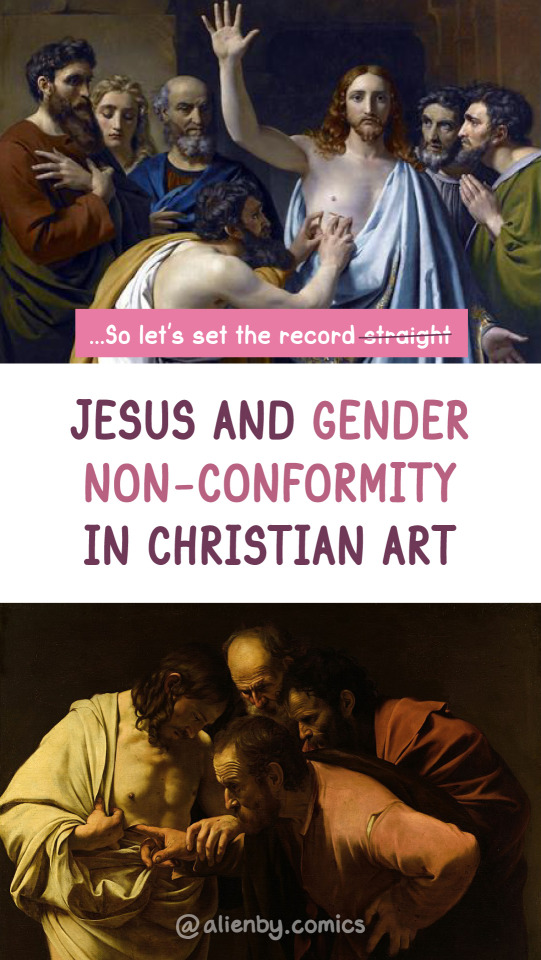

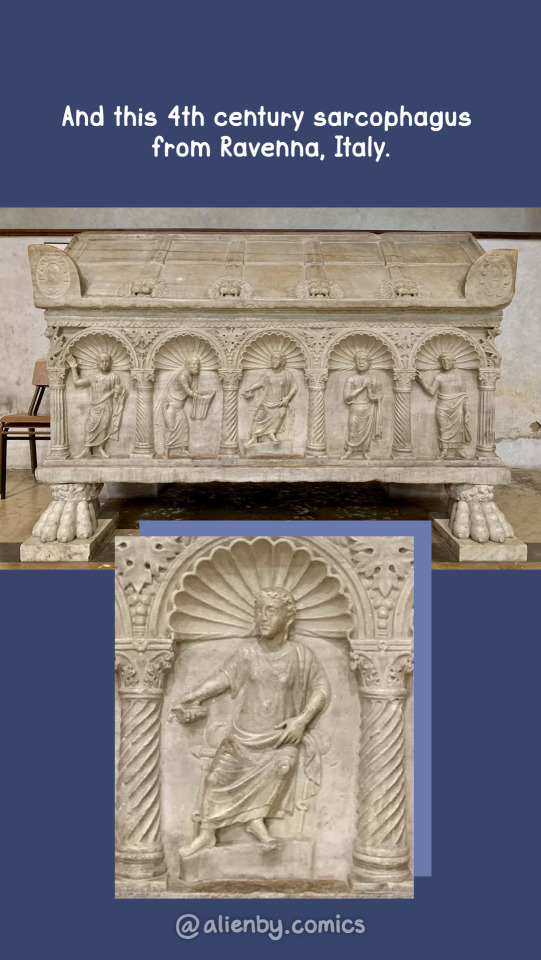


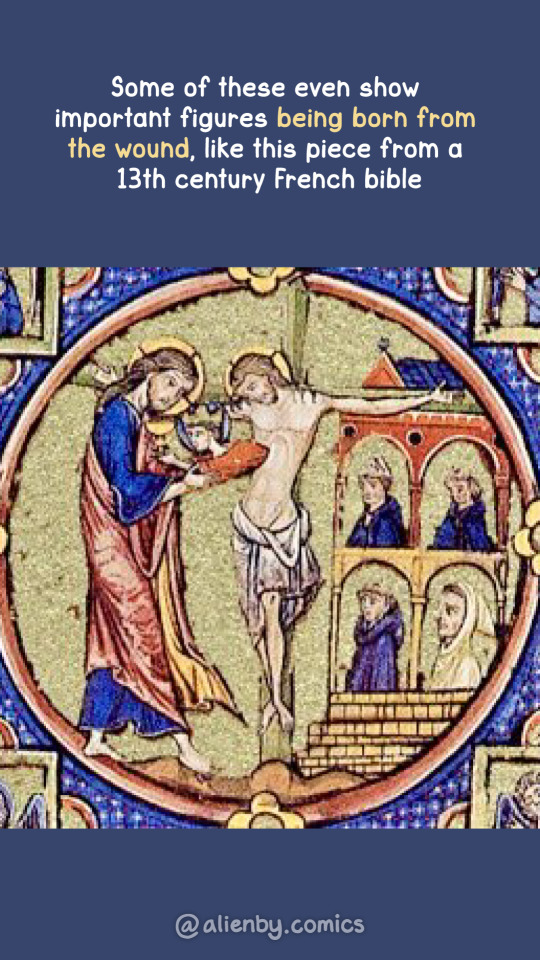


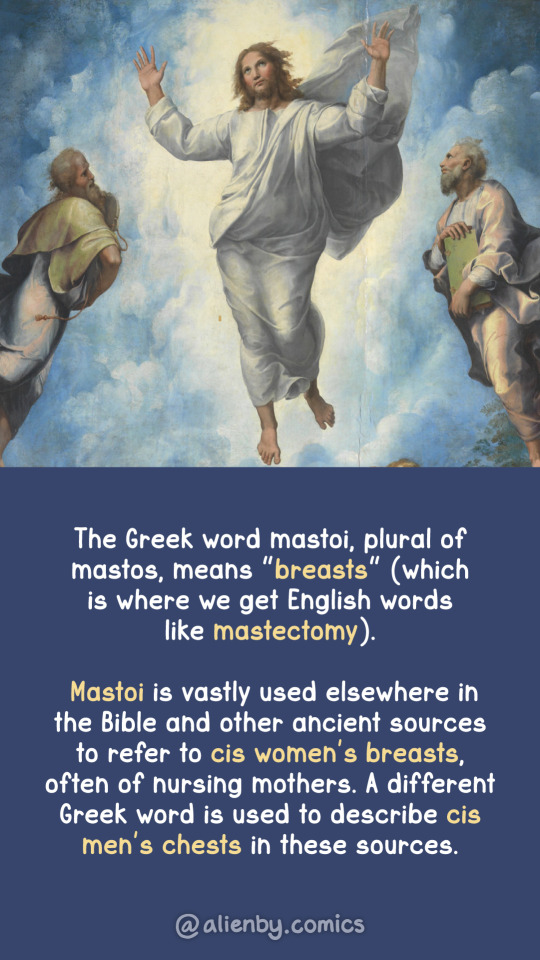
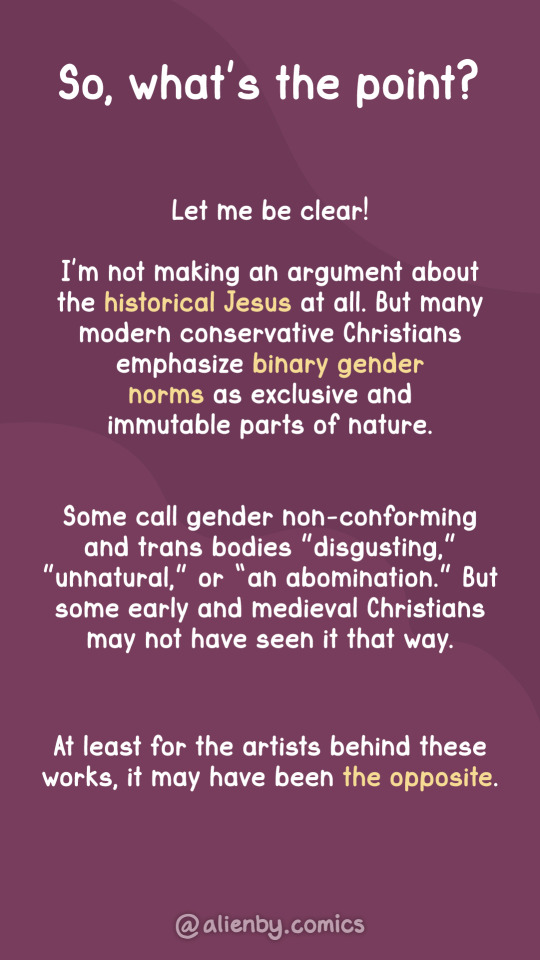
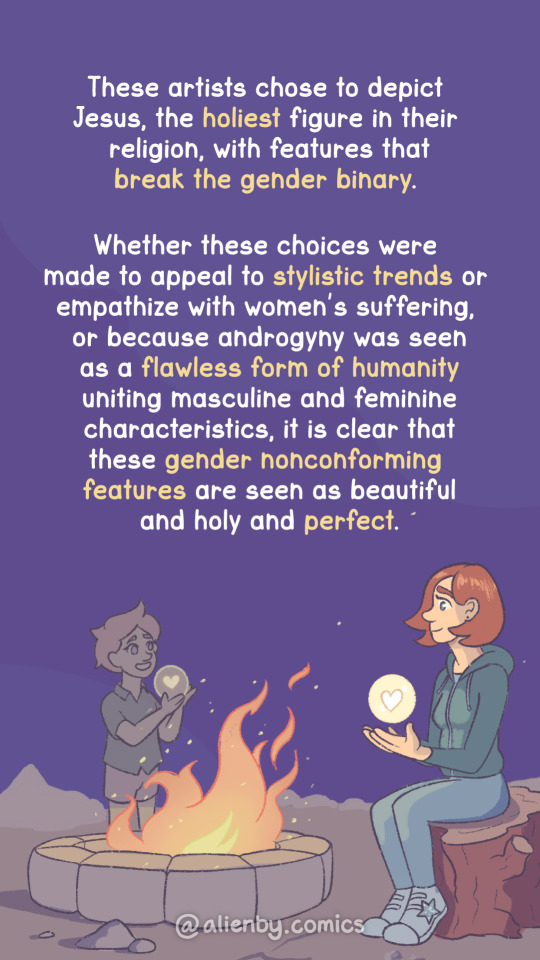

#long post#trans woman#trans man#transgender#cw transphobes#cw wounds#cw religion#exvangelical#ex fundamentalist#ex religious#art history#trans artist#transfem#trans history#lgbtq history#gender nonconforming#cw artistic nudity
14K notes
·
View notes
Text
Live-threading my thoughts while listening to the Thereafter Podcast interview with Sarah McCammon
The following is a transcript of the live-thread I posted while listening to Thereafter podcast 100.
Oh hey! I got sidetracked last week and never got around to listening to the new episode of @thereafterpodcast! I want to get on that right now before episodes start piling up on me. Let's do this!
Wait, @thepursuinglife was in NYC and didn't drive six hours to come have coffee with me in Rochester? How rude! 😝 @thereafterpodcast
.@thepursuinglife and @cortlandcoffey are talking about recent discussions (and examples) of transphobia on Twitter. I don't have anything to add other than complete agreement with them. @thereafterpodcast
. @thepursuinglife: "Google's right there." Silly Meghan. Don't you know that expecting privileged people to use Google is oppression? /s @thereafterpodcast
Gay Jesus is on TIkTok? I'm almost tempted to go check him out. @thereafterpodcast
Random thought while listening: Worldwide, Christians are not the majority. They are a plurality. But if the rest of us banned together, they'd be outnumbered. @thereafterpodcast
On queer the "queer people are groomers" narrative, I think it's also important to note that based on their actions, the people who spread those narrative don't actually care about CSA victims. They do nothing to actually help protect them or prevent their abuse. @thereafterpodcast
And as I was typing that, @cortlandcoffey was saying essentially the same thing. Solidarity, Cortland! @thereafterpodcast
On to the interview with @sarahmccammon_journalist! @thereafterpodcast
Sounds like @sarahmccammon_journalist has an interesting story about how her day job as a journalist forced her to revisit her past religious upbringing. I may have to check out her book. @thereafterpodcast1 reply ·
.@thepursuinglife mentioned that she almost became a missionary. Is that a "near miss" experience? Like "I almost got hit by a car"? @thereafterpodcast
.@sarahmccammon_journalist is sharing her approach to and views of journalism and it's cool. @thereafterpodcast
.@sarahmccammon_journalist is talking about how she didn't realize how strong or important a voting block (white) evangelicals were when she was growing up. I can relate to that. I think a lot of evangelicals try to portray themselves as only loosely organized. My cynical side says that's for the sake of plausible deniability. @thereafterpodcast
.@thepursuinglife is being a good podcast host and drumming up interest for @sarahmccammon_journalist's book. 🤣 @thereafterpodcast
.@sarahmccammon_journalist mentioned in passing that some people she talked to shared that they noticed family members starting to get into conspiracy theories. I'll be honest that I personally expect to get that to become far more common in evangelical circles as time goes by. @thereafterpodcast
My personal opinion on some of the white supremacy and other problems we're starting to see in the evangelical movement is that it's not so much a new thing but is just something more people are feeling more comfortable with being open about. @thereafterpodcast
My evidence for this is how many former evangelical spaces also struggle with fully divesting themselves of white supremacy. @thereafterpodcast
.@sarahmccammon_journalist: "I think Trump is a symptom of something larger." YES! @thereafterpodcast
People who leave the church are evangelicals' version of Bruno. They don't talk about them. @thereafterpodcast
Some days I wish that were true. Because when they do talk about us, it's not pretty. @thereafterpodcast1 reply ·
Let me once more pitch my theory that one of the unifying themes (and problems) of modern white evangelicalism is authoritarianism. @thereafterpodcast
.@sarahmccammon_journalist is talkinga bout how former evangelicals today seem to have more options for finding community today. I agree and I love that fact. @thereafterpodcast
A rule for the @thereafterpodcast drinking game: Whenever anyone on the podcast says the word "resonates," drink. Maybe chug.
.@sarahmccammon_journalist is talking about the shifting views of the media since Trump and it's a nuanced and thoughtful take. @thereafterpodcast
Yeah, Trump supporters seem unapologetically violent with their rhetoric at times. @thereafterpodcast
Another great episode! @thereafterpodcast
0 notes
Text
Teaching children thinking bad thoughts about someone is the same thing as murdering that person is fucked up.
Thought crime doesn’t exist. No one has ever been harmed or killed by someone thinking negative thoughts about them.
You know what has harmed people though? Teaching them they are evil for things they can’t control. Especially those who have intrusive thoughts.
Here’s for everyone who has been taught their thoughts make them evil.
Intrusive thoughts are not your secret desires.
They are involuntary.
You don’t need to be ashamed of them.
They will pass.
You are not committing taboo.
No one can read your mind.
No one will ever know what’s in your thoughts unless you feel like telling them.
No one can judge you for what you are thinking, whether voluntarily or involuntarily.
Your thoughts are private
You are not a bad person.
#religious recovery#reminders#i was randomly reminded of being taught that thoughts are harmful in sunday school#intrusive thoughts#ex religious#deconstruction#exvangelical#apostate#deconverted#deconversion#exmo#exjw#exmormon#ex fundie#thought crime
20K notes
·
View notes
Text
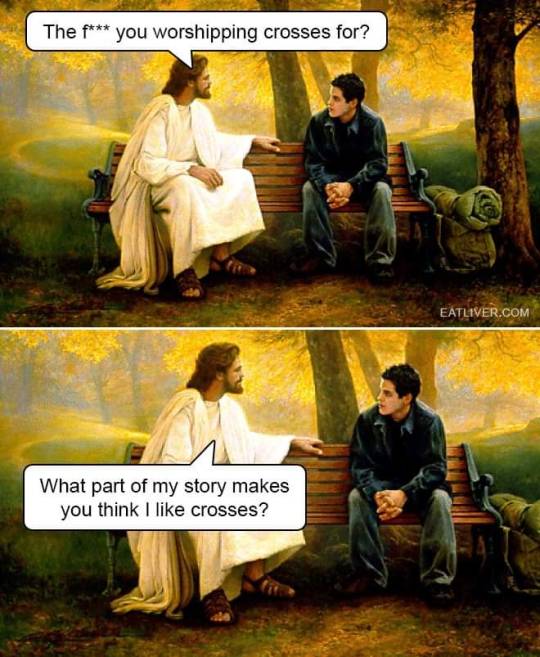
32K notes
·
View notes
Text
I love how he finds the words to describe the concepts that float around my head daily ❤️❤️❤️❤️ love him!
#please the ACCURACY#deconstruction#ex pentecostal#ex christian#exvangelical#john piper#Abraham piper#ex fundamentalist#ex fundie#christian fundamentalism
13K notes
·
View notes
Text
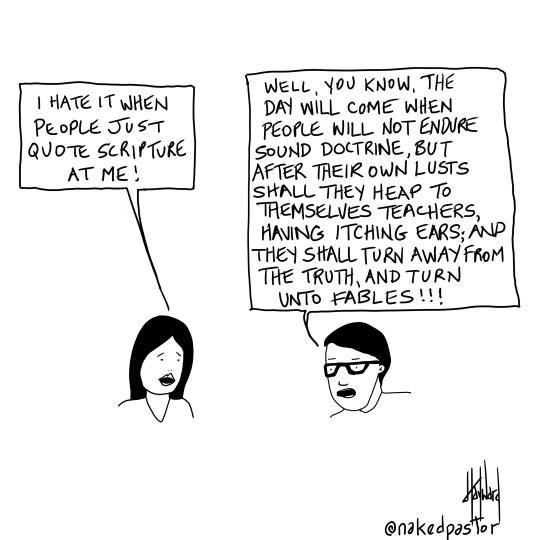
People quote scripture at me all the time.
Some assume I've never heard it before.
And if I have, then I've forgotten or failed to understand it.
Or I'm rejecting it and need to be corrected with it.
A lot of people use the bible against me like my dad used his belt against me when I was a kid.
It simply does not get the results they hope it should.
13 notes
·
View notes
Text
Stories
Changing Paths challenge day 16 — stories.
The power of stories to change and challenge a person’s worldview is immense. My worldview was definitely informed by reading A Wizard of Earthsea by Ursula Le Guin, Tolkien’s The Hobbit and Lord of the Rings, The Writing on the Hearth by Cynthia Harnett (now sadly forgotten by most people), Mary Stewart’s Arthurian trilogy, and The Little Prince by…

View On WordPress
#books#Changing Paths#Changing Paths blogging challenge 2023#Cynthia Harnett#exvangelicals#imagination#JRR Tolkien#Mary Stewart#other people’s journeys#Pagan#Paganism#stories#Ursula Le Guin
0 notes
Text
instagram
intersectional_feminismmm 🤎🤎🤎
CW: SA, paedos, spiritual trauma
Part 2/2
•
#IntersectionalFeminism #IntersectionalFeminismmm #Exvangelical #Exvangelicals #AbortionAccess #EndRapeCulture #AbolitionNow #ProAbortion #AbortionIsHealthcare #RoeVWade #abortion #feminist #feminism #Atheist #EndSlutShaming #Exfundie #AbortionRights #DisabilityRights #DisabledAndProud #SmashThePatriarchy #ProChoice #Leftist #FreeHealthcare #TransRights #TransRightsAreHumanRights #GirlsJustWantToHaveFundamentalRights #ExChristian #ExMormon
#Instagram#IntersectionalFeminism#IntersectionalFeminismmm#Exvangelical#Exvangelicals#AbortionAccess#EndRapeCulture#AbolitionNow#ProAbortion#AbortionIsHealthcare#RoeVWade#abortion#feminist#feminism#Atheist#EndSlutShaming#Exfundie#AbortionRights#DisabilityRights#DisabledAndProud#SmashThePatriarchy#ProChoice#Leftist#FreeHealthcare#TransRights#TransRightsAreHumanRights#GirlsJustWantToHaveFundamentalRights#ExChristian#ExMormon
1 note
·
View note
Text
Repost: Should I stay or should I go?
Should I stay or should I go? Exploring a journal prompt from chapter 2 of “Changing Paths”
Excellent post from Jarred reflecting on one of the journal prompts from Changing Paths.
Hello dear readers! It’s Friday morning so that means once again exploring a journal prompt from the wonderful book, Changing Paths…
Should I stay or should I go? Exploring a journal prompt from chapter 2 of…
View On WordPress
#authentic self#changing direction#Changing paths#changing tradition#exvangelicals#Jarred the Wyrd-Worker#leaving religion#LGBTQ#LGBTQ2SIA#other people’s journeys
0 notes
Text
the way the other angels treat aziraphale reminds me of how people at church would treat obviously queer kids who didn’t know they were queer yet. especially in the flashback scenes and in s1. they all see he’s different and treat him like shit but in that really vague passive aggressive christian way y’know
#does this make any sense#good omens#good omens 2#aziraphale#religious trauma#exvangelical#muriel#gomens#gomens 2#ex evangelical#aziracrow#queer#growing up religious#ineffable husbands#metatron#my posts
3K notes
·
View notes
Text
i’ve read so much tradcath bullshit the last two years. i can confidently say tradcath men fit into one of two categories:
“protestant-raised and converted to catholicism because of his crippling porn addiction and racist tendencies. reposts crusader and conquistador memes. is hated in his local parish.” tradcath
“catholic-raised band kid who ate his lunches with the religion teacher. smells like mildew. cut off all his friends that came out as gay after high school. now larps as an aquinian scholar and cries after jerking off.” tradcath
#|| the disciple ||#ex catholic#ex christian#religious trauma#exvangelical#deconversion#apostate#apostasy#ex fundie#extian#deconstructing christianity#ex religious#ex cult#ex cath#religious deconstruction#deconstruction#catholic guilt#progressive politics#leaving the church#losing my religion
1K notes
·
View notes